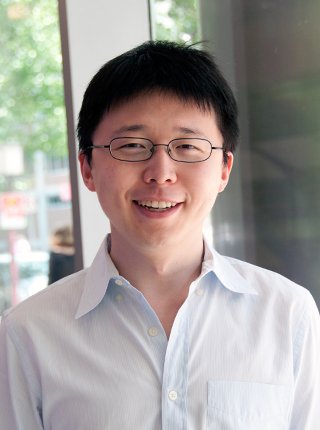Feng Zhang
2017 National Award Winner — Faculty

Current Position:
Core Member, Broad Institute of MIT and Harvard; Investigator, McGovern Institute for Brain Research; James and Patricia Poitras Professor in Neuroscience, MIT; Associate Professor, Departments of Brain & Cognitive Sciences and Biological Engineering, MIT
Institution:
Massachusetts Institute of Technology; The Broad Institute of MIT and Harvard
Discipline:
Biomedical Engineering & Biotechnology
Recognized for: Advancing innovative technologies that have revolutionized biomedical research: the CRISPR-Cas9 genome-editing system, giving scientists precise control in manipulating the genome of mammalian cells, as well as optogenetics, which allows researchers to use light to control the activity of specific groups of neurons in living animals
Areas of Research Interest and Expertise: Molecular Technologies; Neuroscience, Microbiology; CRISPR; Genome-Editing; Optogenetics
Bio:
Ph.D., Chemistry, Stanford University
A.B., Chemistry and Physics, Harvard University
Prof. Zhang has developed pioneering technologies which he deploys to study the function and disease of the nervous system. Most notably, Prof. Zhang’s group was the first to harness the CRISPR-Cas9 system for genome-editing in human and mouse cells. He and his team engineered this naturally occurring system and repurposed it to cut DNA at specific sites within the genome that are specified by a complementary RNA guide. After the cut is made, repair processes can insert, remove, or change nearby portions of DNA, thereby altering gene expression and cellular functions. The CRISPR-Cas9 system is now the cheapest and most efficient genome-editing technology available. By adapting the CRISPR-Cas9 system for use in mammalian cells, Prof. Zhang’s work opened up incredible potential for applications in scientific research, biotechnology, and disease treatments.
The Zhang lab continues to develop novel molecular technologies and apply them to better understand brain disorders:
Expanding the genome editing toolbox – increased specificity of the CRISPR-Cas9 system, harnessing additional Cas enzymes with novel properties that can be leveraged for genome editing (for example, Cpf1), and discovery of RNA-targeting CRISPR systems.
Developing genetic screening platforms – using CRISPR-Cas9, the Zhang lab has developed both loss- and gain-of-function high-throughput screening platforms that they have used to probe gene regulation, the function of the non-coding genome, and cancer drug resistance and tumor growth.
Studying brain disorder – genome editing has greatly accelerated the ability to create disease models, and the Zhang lab has applied these tools to understand the function of a number of genes associated with autism spectrum disorder.
One of the driving questions behind our work is “How do our brains really work, at the molecular level, and how are the normal processes perturbed in neuropsychiatric disease?” The brain is so complex that there is a real need for better molecular tools to dissect neuronal molecular processes and circuits, and we are trying to develop these tools and apply them to the brain.
Key Publications:
- Gootenberg JS, Abudayyeh OO, Lee JW, Essletzbichler P, Dy AJ, Joung J, Verdine V, Donghia N, Daringer NM, Freije CA, Myhrvold C, Bhattacharyya RP, Livny J, Regev A, Koonin EV, Hung DT, Sabeti PC, Collins JJ, Zhang F. Nucleic acid detection with CRISPR-Cas13a/C2c2. Science 2017
- Abudayyeh O.O., et al. C2c2 is a single-component programmable RNA-guided RNA-targeting CRISPR effector. Science. 2016.
- Zetsche, B., Gootenberg, J. S., Abudayyeh, O. O., Slaymaker, I. M., Makarova, K. S., Essletzbichler, P., Volz, S. E., Joung, J., van der Oost, J., Regev, A., Koonin, E. V. & Zhang, F. Cpf1 Is a Single RNA-Guided Endonußclease of a Class 2 CRISPR-Cas System. Cell (2015).
- Cong, L.*, Ran, F.A.*, Cox, D., Lin, S., Barretto, R., Habib, N., Hsu, P.D., Wu, X., Jiang, W., Marraffini, L.A., & Zhang, F. Multiplex genome engineering using CRISPR/Cas systems. Science. 2013.
Other Honors:
2016 Canada Gairdner International Award
2016 John Scott Award
2016 Tang Prize in Biopharmaceutical Science
2014 Society for Neuroscience Young Investigator Award
2014 Alan T. Waterman Award (for optogenetics and CRISPR-Cas9)
2014 Jacob Heskel Gabbay Award in Biotechnology and Medicine
2012 W. M. Keck Foundation Medical Research Award
2012 Perl/UNC Neuroscience Prize
In the Media:
CRISPR Pioneer Feng Zhang Talks About What's Next for Gene Editing, Motherboard, May 23, 2016
The Gene Hackers, The New Yorker, November 16, 2015
Meet one of the world’s most groundbreaking scientists. He’s 34., STAT, November 6, 2015
Zhang Lab
